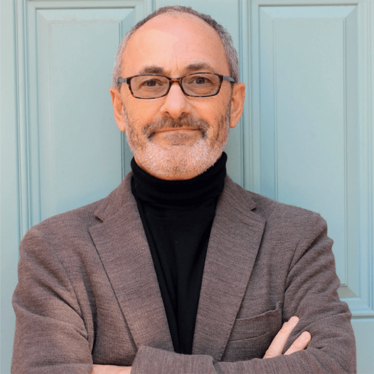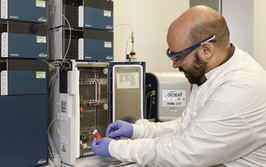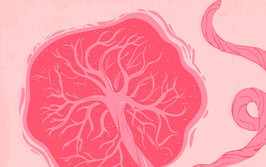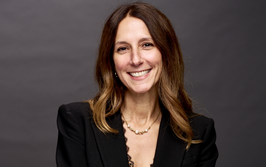Demystifying Cancer R&D
Sitting Down With… Matthew Ellis, Senior Vice President, Early Oncology, Oncology R&D, AstraZeneca
Maryam Mahdi | | 5 min read | Interview

When it comes to oncology research, Matthew Ellis, Senior Vice President, Early Oncology, Oncology R&D at AstraZeneca, is nothing short of an expert. With experience of both academia and industry, he’s had a career-long ambition of lessening the burden of cancer on society. In his new role at AstraZeneca, he aims to reach new heights and bring new medicines to patients worldwide. Here, he details the lessons learned throughout his career and how he would like to see cancer R&D change in the future.
What first sparked your interest in oncology?
As a junior doctor, I met many patients dying of cancer with no hope of treatment. For other patients – for example, those with testicular cancer or Hodgkin’s lymphoma – I asked myself: “Why are drug treatments successful in one setting and not another?” Nobody had an answer for me, but my instinct told me to try and find out.
The 1980s were the early days of molecular biology of cancer, with RAS mutations, MYC and HER2 amplification, and TP53 loss discovered during this time. Science was beginning to demystify cancer.
What events triggered your decision to pursue a career in pharma?
After a lifetime in academia – and now, as a cancer survivor myself – I became impatient with the slow progress the cancer research community is making for patients. University research is great at developing therapeutic hypotheses, but not so good at delivering on these insights. At this point in my career, I wanted to help deliver more effective and less toxic drugs to patients most in need.
In your view, what have been the biggest or most exciting breakthroughs in cancer research?
There are a significant number of recent breakthroughs and innovations in cancer research that make me feel very optimistic. Clearly, immunotherapy for cancer based on inhibiting T-cell checkpoints has had a notable impact. Treatments based on a profound understanding of cancer etiology are equally exciting; for example, antibodies and small molecules that target drivers of cancer and PARP inhibitors that exploit tumor-specific dependencies. There have also been new developments in antibody-drug conjugates, where essentially a chemotherapy agent is attached to an antibody that specifically targets the tumor cell, sparing normal tissue. Advances in computer science, artificial intelligence, and machine learning will also allow us to make drugs much faster. I hope that soon there will be no such thing as an “undruggable” or “intractable” target; everything will be druggable.
You have designed and published multiple clinical trials. How can trials be enhanced?
A few areas come to mind. Clinical trial participation in the US is very low, with only 5 percent or less of all cancer patients participating. Thus, developing approaches that make trial participation more accessible and more convenient would certainly accelerate participant accrual. These approaches could include virtual visits, blood tests close to home, and wearable devices to monitor patient health.
Another area concerns predictive diagnostics. We are getting better at predicting the therapeutic vulnerabilities of each tumor by using biomarkers and computational pathology. These techniques allow us to select the correct patient population for a clinical trial so that we can observe responses to new medicines from the very beginning; such an approach could dramatically accelerate drug development.
The diagnostic field is also offering new approaches to monitoring treatment response based on blood tests that are more convenient and sensitive than radiology. It would be a huge advance if trial participants could simply avoid repeat CT or MRI scans. Blood-based testing can also help identify cancer earlier in the course of disease and provide crucial information on the type and severity of cancer. These types of tests can also reveal new points of intervention, allowing oncologists to deliver truly personalized treatment approaches.
A final imperative for the industry is to ensure trials represent patient populations for the disease we aim to treat, prevent and, in the future, even cure, so we can be sure we are creating therapies that benefit allpatients. And that will require a concerted effort across industry, government, and healthcare, and include aspects such as more representative investigators, decentralized trials, better consent forms, and more culturally sensitive explanations of the nature of the study approach to participants.
Why AstraZeneca?
The diverse pipeline at AstraZeneca allows me to pursue a truly unique opportunity in early oncology research, where different approaches to tumor targeting can be put together in logical ways that directly stem from a deep understanding of each patient’s cancer. On top of that, there is a tangible culture of innovation and risk-taking, while having access to world-class experts across fields and unique partnerships helps us to achieve our goals.
How will you apply your experience to your new role?
I’ve been on both sides of the medical chart – as a breast cancer oncologist and cancer biologist for 30 years, and as a prostate cancer survivor. I’ll be applying all my experience from both the academic bench and the waiting room to focus on the needs of our patients at the forefront of everything we do in early oncology research.
What are your goals for the rest of the year?
I plan to comprehensively review AstraZeneca’s early pipeline to determine the most promising molecules. Equally important to me is addressing the barriers that patients face when it comes to clinical trial participation, with the aim of getting to a point where everyone can one day access the best cancer care. I also want to accelerate preclinical research, so we have even greater confidence that a proposed new drug is likely to be effective. Finally, I will look at our diagnostic approaches to ensure we continue our focus on getting the right therapeutics to the right patients – especially with the next wave of medicines.
In what ways would you like to see R&D for cancer change?
I believe that, as an industry, we must push forward without fear of failure, embrace the digital evolution in oncology R&D, and prioritize targeted treatments that are even more effective. In particular, I’d like to continue to build our collaborations between academia and industry, working together to better understand cancer biology and optimize treatment approaches.
It’s a truly revolutionary time in oncology right now – for the industry as a whole and for all patients with cancer. New therapeutic approaches, combined with industry commitment to equity across clinical trials, open doors to treatment for a number of patients who previously had few-to-no options. I am committed to accelerating and enhancing our ability to deliver on this promise.
After finishing my degree, I envisioned a career in science communications. However, life took an unexpected turn and I ended up teaching abroad. Though the experience was amazing and I learned a great deal from it, I jumped at the opportunity to work for Texere. I'm excited to see where this new journey takes me!



















